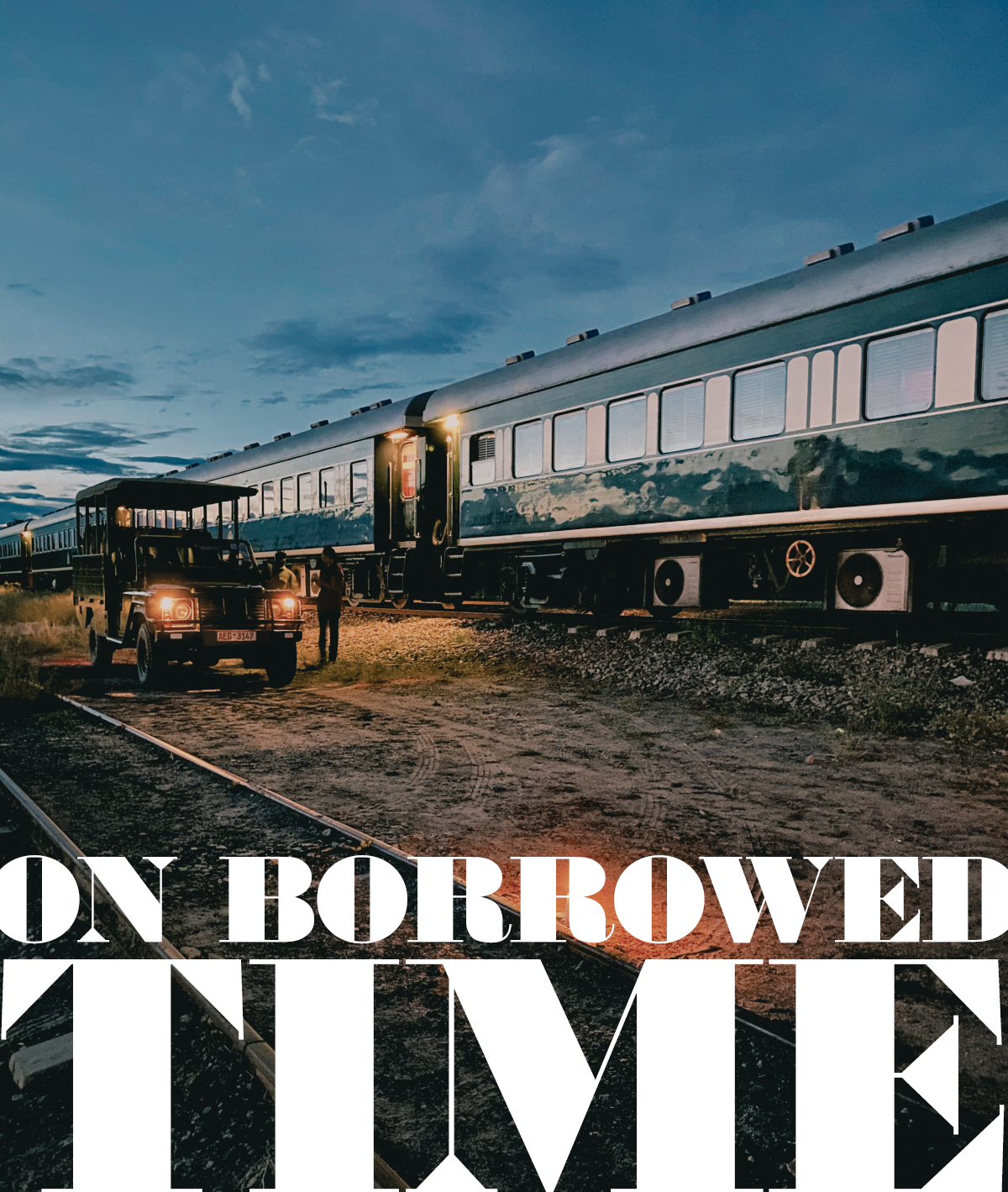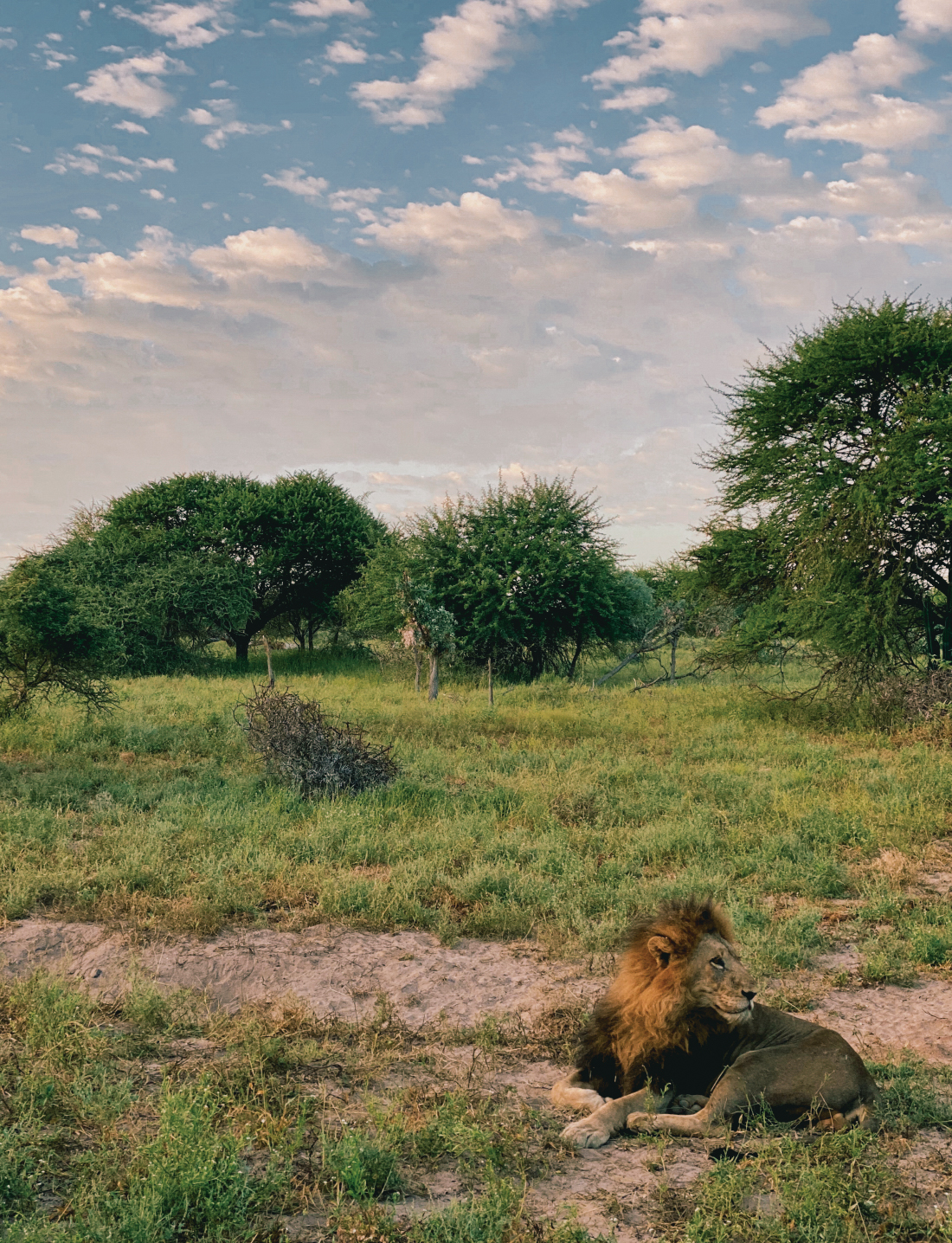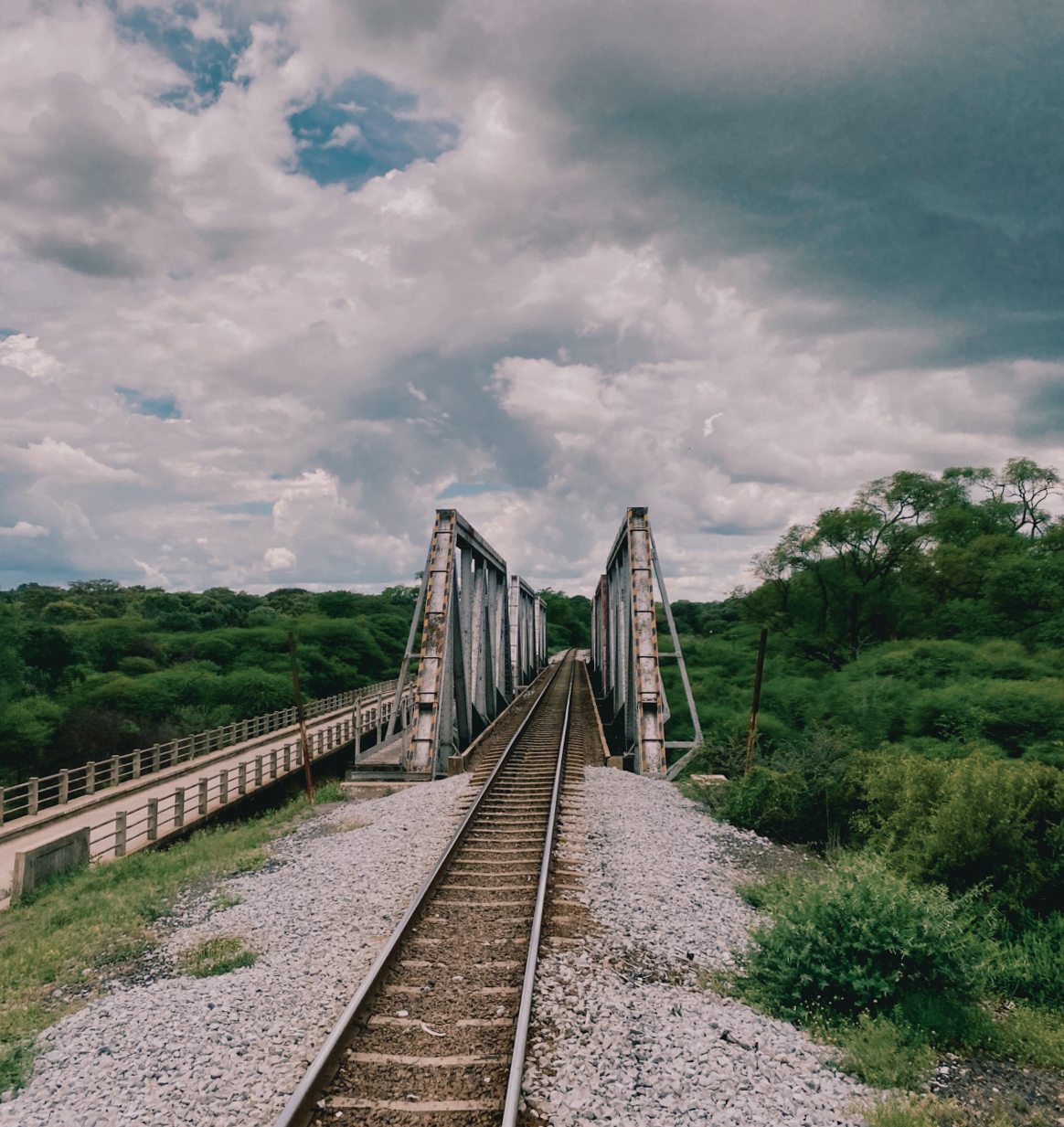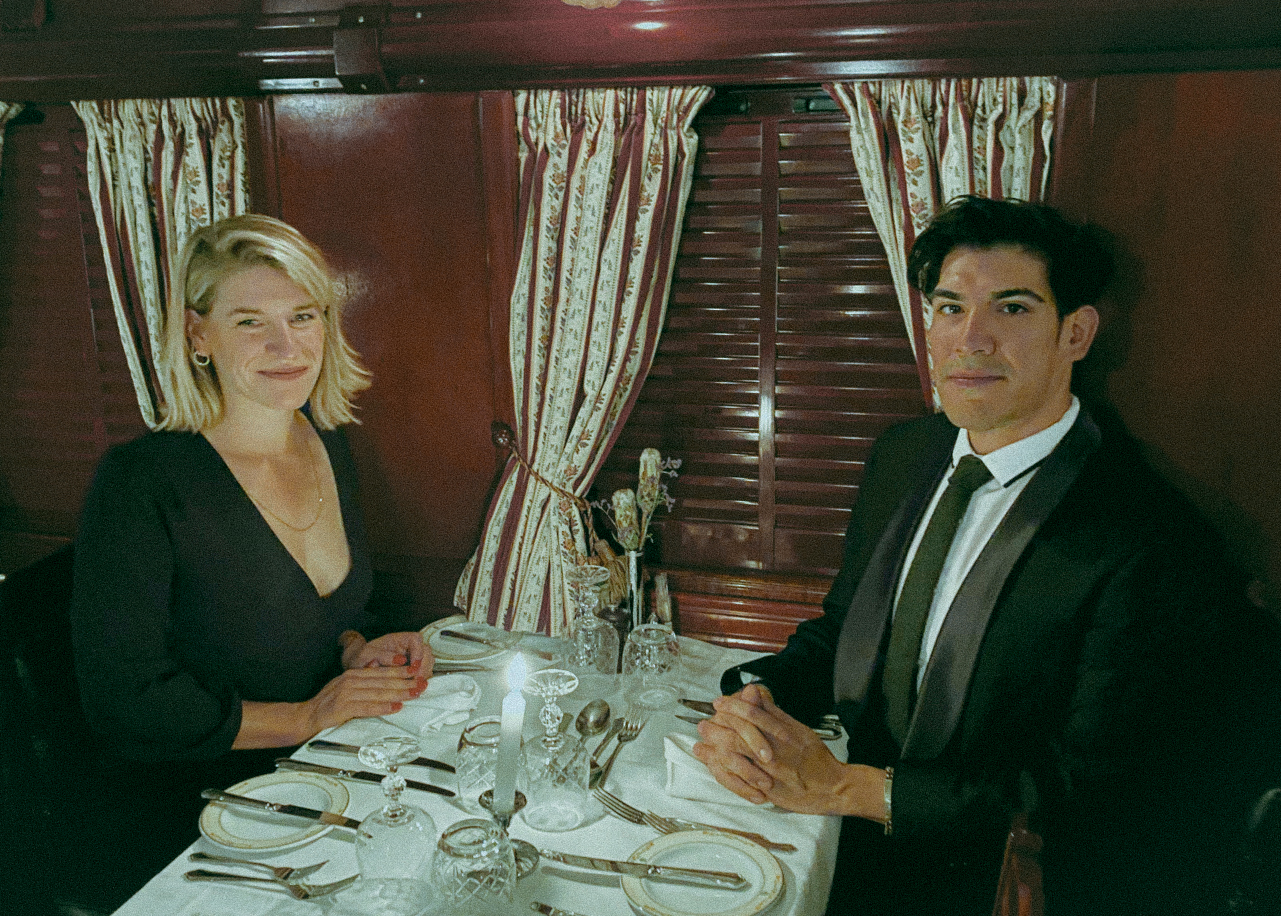Three days on a train in Southern Africa while the world ground to a halt.
By Sofia Sokolove
From the July/August 2020 issue of the Alcalde
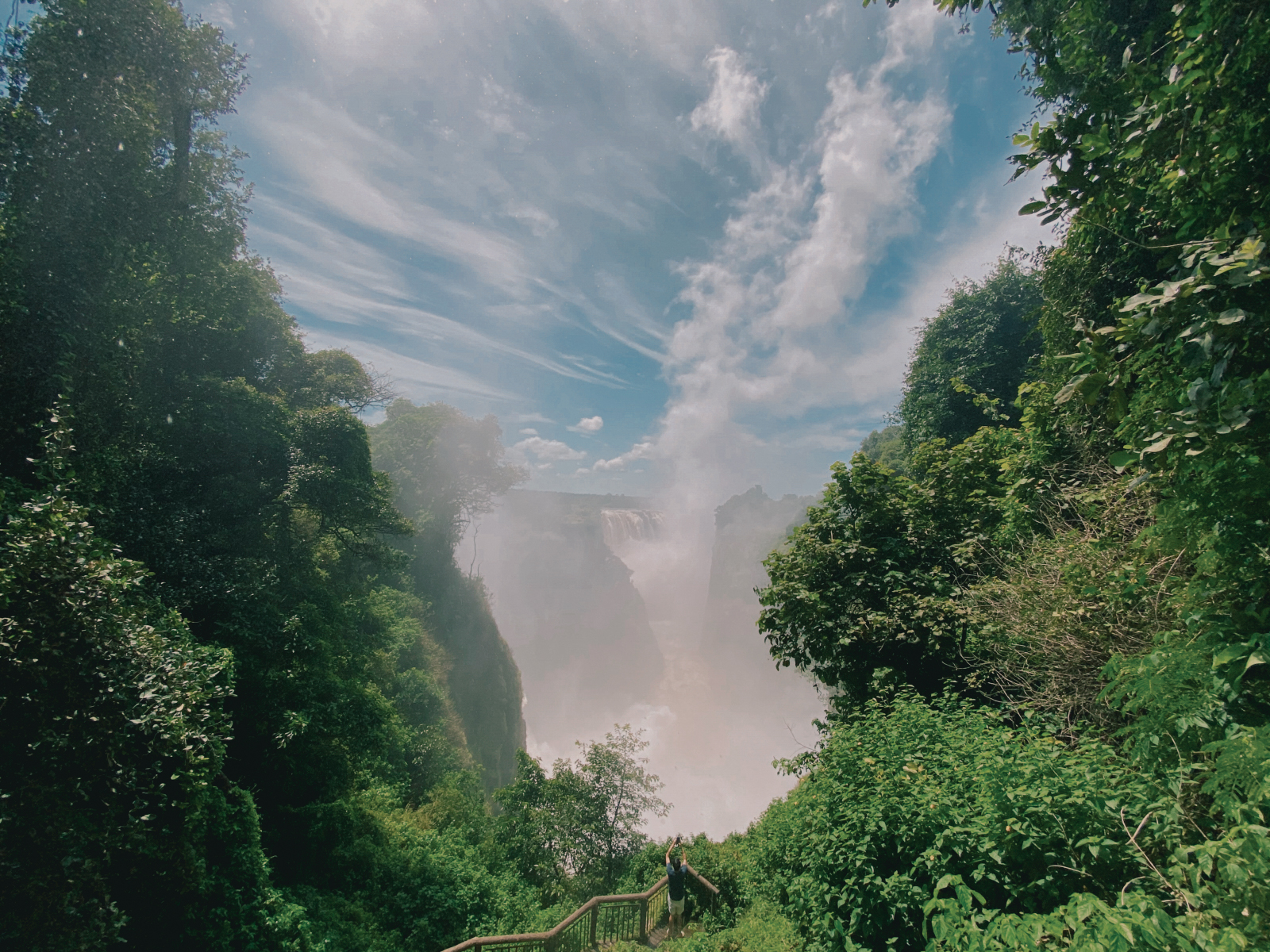
Victoria Falls, Zimbabwe.
the very same day the World Health Organization declared the novel coronavirus a global pandemic, my boyfriend and I, along with 22 other Flying Longhorn passengers, were over 9,000 miles away from home in Johannesburg, South Africa. We were halfway through the trip of a lifetime and about to go totally off the grid on a train ride through rural Zimbabwe to Victoria Falls.
As I write this now in late May, on our 70th day of social distancing, it feels nearly impossible to remember anything other than the right now, a moment in which the omnipresent virus has seeped into even the most mundane parts of our lives, from goofy Zoom waves that would have once been hugs to the cloth mask hanging by the door next to the dog’s leash. In early March, though, there were moments that existed outside of this new reality.
Here’s one: On March 7, the third day of our trip, I rode shoulder-to-shoulder with other tourists in an enclosed glass cable car to the top of Table Mountain, Cape Town’s most iconic landmark. As we inched our way up, our birds-eye view of the city expanding in every direction, we shared in a sort of collective awe—the kind that comes from silently locking wide-eyes with a stranger as if to ask, “Are you seeing this beauty, too?”
Later that afternoon, in the pool of our pastel pink 121-year-old hotel that looked like the set of a Wes Anderson film, I floated lazily on my back and gazed right back up at the mesmeric, flat-topped mountain. If I’d known then how often I’d need to conjure up that moment of bliss now, or that it was likely my last swim of 2020, I would have stayed there all night.
Here’s another: After four days in a vibrant and bustling Cape Town, we flew northeast to Hoedspruit, South Africa, and settled into our home for the next four days, Waterside Lodge at Thornybush Nature Reserve, inside Kruger National Park. One of the largest game reserves on the continent, the park covers nearly 8,000 protected square miles and bumps up along the borders of Zimbabwe and Mozambique. Almost immediately upon arrival, we dropped our bags and set off on our first game drive. Within 15 minutes of cutting through bush in our open-air safari land cruiser, we were staring at a critically endangered black rhino—one of only 5,000 or so left in the world. We sat in silence, taking in the hugeness of this beautiful, solitary giant, while just beyond him on the horizon the bright orange sun started an unhurried descent.
That night, when we were awoken by a repetitive, low-pitched “purrrrr,” we convinced ourselves it was nothing. But on our 5 a.m. game drive that morning, our guide set out with dogged intention, speeding through the park before stopping triumphantly in front of a handsome male lion, sitting regally as the sun rose. “Thanks for talking to us last night,” our guide said to him gently, “and letting us know where you were.”
A lion sits regally in Kruger National Park, South Africa.
Train tracks in rural Zimbabwe.
Meanwhile, COVID-19 cases were rising worldwide, including in South Africa, which confirmed its first case on March 5. Back home, there were suddenly over 200 new cases being reported each day—up from just 25 new cases reported on the day our trip began—and Austin, which had yet to report a single case upon our departure, had declared a local state of disaster. South by Southwest, for the first time in the festival’s history, was canceled.
But service was spotty in the bush, and so while we were keeping a cautious eye on what was happening at home as best we could, the biggest news of each day was centered in the here and now: The elephants had once again taken a mud bath by that same watering hole; the leopard was nearly done with its three-day impala feast; a giraffe had wandered right up to the lodge during lunch, poking its long neck around to see what we were up to.
When we landed in Johannesburg, though, our phones buzzed back on with a vengeance. Tom Hanks had just announced that both he and his wife, Rita Wilson, had coronavirus; the NBA halted its season after players tested positive for COVID-19; during a press briefing, President Trump said he would be “suspending all travel from Europe to the United States for the next 30 days.” March 11, 2020, was a strange day to reemerge from one of the most isolated—and blissful—places on Earth. Stranger still was that in a time of increasingly great uncertainty, we were about to voluntarily know even less. The Rovos Rail, the luxury train line we were set to board at 9 a.m. the next morning, had no radios, TVs, or WiFi onboard, to “maintain the spirit of a bygone era.”
After a sleepless night full of calls from home, our new “normal,” one dominated entirely by this virus, had come into sharp focus; the languid days at Thornybush already fading into our rear-view. We could, along with every other American abroad, try to furiously rebook ourselves a trip home, even as conflicting information around travel restrictions still swirled. Or, we could see this as an immense gift: three extra days of the “before”—a final chance to collect memories not tainted with fear. So, we hopped onboard a locomotive sleeper train and went back in time.
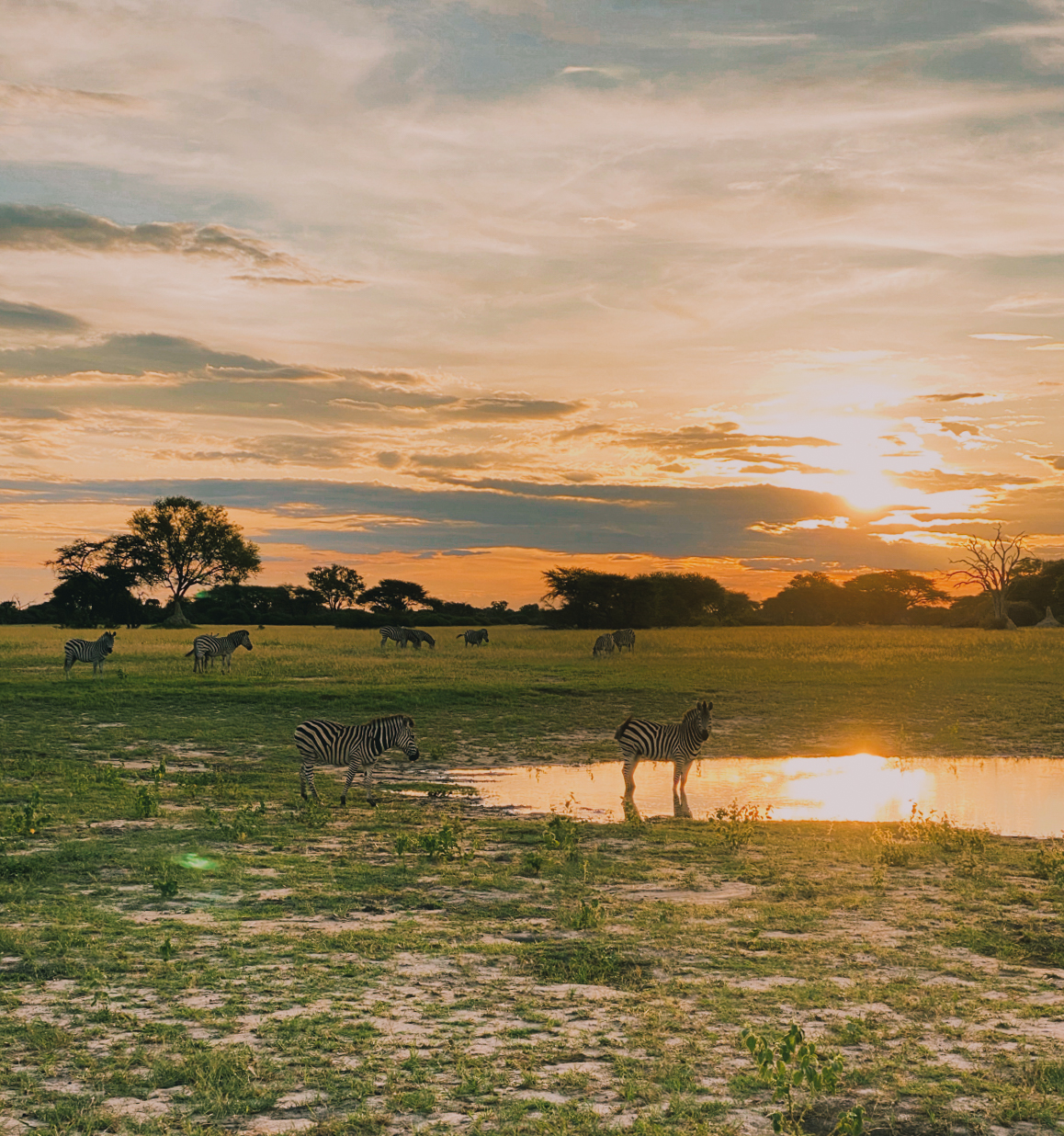
Zebras enjoy the sunset in Hwange National Park, Zimbabwe.
Over the next three days, we chugged through rural Zimbabwe, watching the terrain change from hardened, dusty clay to lush, rolling greenscapes. The train passed through villages living completely off the electric grid, full of mud homes with thatched roofs. We lingered in the dining car, stretching lunches and dinners out for hours as we spotted wildlife through the windows, letting the scenery and endless chenin blanc lull us into sprawling, meaningful conversations with our fellow travelers. One evening, we had a nightcap out on the observation car, sitting in the silence of the fresh air for a bit before realizing that we were blanketed under the kind of big, swirling sky I’ve only ever seen in Africa, one vast enough for us to look up and see the Milky Way and the Southern Cross all at once.
No one onboard—staff or guests—had any service. Once or twice, we huddled around a push alert that came through on someone’s phone, only to realize it was days old. When we pulled into Zimbabwe’s Hwange National Park on our final full day, I turned my phone on in a futile search for service, before giving up and leaving it on the train. Instead, as we took a game drive, I tuned in to the chirps of the birds, watching their iridescent feathers stretch out and take flight over the Serengeti-like landscape. Turning into a Harry Potter-esque forest full of howling monkeys, our guide ushered us all off the jeep and out under the trees, “just to feel the ground under our feet.”
On our last morning on the train, as the tracks curved around the Zambezi River, we sat in the observation car, looking toward the distance, where thick mist drifted high up into the sky. Our final destination, Victoria Falls, one of the world’s largest waterfalls, was in sight. Which also meant the end of our stolen time—of our delayed entry into a global pandemic—was in sight. When we arrived a few hours later, messages from friends, family, and coworkers would begin pouring in. Arrangements would need to be made, flights rerouted and rebooked, plans put in place for arriving home to a country sheltering in place.
Which is where we’ve been since—staying at home in our one-bedroom condo for over two months. On the train and in the bush, focusing on what was right in front of us helped to keep our fears of the future at bay.
At home, I’m learning to do the same: Look at that adorable new spot the dog found to sun herself in; yesterday, the green buds on the balcony had sprouted little purple spots, today they have burst into bloom. Travel, at its best, isn’t just an escape. It’s a way to work the muscle of our minds, a forced break from routine that resets the system and demands our full presence. In such unprecedented, challenging times, I feel like my presence—my capacity to direct my full attention toward where it’s needed most—is the greatest tool at my disposal. To have been given, on top of an unbelievable trip, a three-day grace period to hone that skill was a privilege I’ll never forget.
Photographs by Sofia Sokolove
Dinner onboard the Rovos Rail.
Stories like these are supported by membership in the Texas Exes.
Join today to receive the bimonthly Alcalde magazine, and help keep alumni connected to UT.
